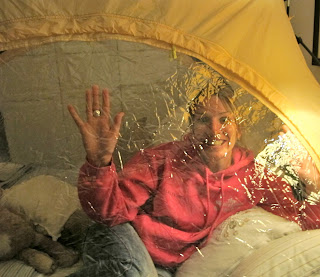For the past 8 weeks my bedroom has become a tourist attraction… I don’t believe that it’s hit ‘Time Out's Top 10 Things to See in London” yet (although I’m sure that it would make good advertising for the White Company) but it has raised a few eyebrows from guests to the flat....
I came home the other day and my flatmate mentioned that a friend had come round and happened to peek into my room and demanded, “What’s up with your flatmate – is she into that Michael-Jackson sh*t..” alluding perhaps to the rumors that in the 1980s, the King of Pop slept in a hyperbaric chamber to slow the ageing process. I personally prefer to rely on Oil of Olay as my ticket to eternal youth.....
My bedroom has also become a playground – my friend’s two children recently came over and I quickly saw the tent transformed into a jungle-gym as the plastic ‘door panel’ of the tent quickly turned into a make-shift slip n’slide with my feather duvet serving to break their fall.
I can’t claim that the altitude tent has done wonders for my sleep pattern and do wonder every night as I zip up the flap to ‘seal’ the tent and provide the controlled environment into which the air is pumped whether it's working with a loud <whooshing> sound. It’s really not a surprise that Mo Farah and a handful of Olympic athletes were forced to sleep in their altitude tents outside of the Olympic Village for the duration of the games because of the noise. The small beer-fridge size machine which sounds like a low-decibel lawnmower is connected to the ‘tent’ with an 8 foot long clear plastic hose which pumps the oxygen controlled air into the tent. The body’s response to the lack of oxygen is to stimulate the production of red blood cells, giving the blood better oxygen-carrying capacity and lowering the heart rate. This is extremely important for endurance athletes like Mo Farah, football players such as Wayne Rooney recovering from injury, and something that will be very important to me in just over a weeks time as I make my way up to Makalu Base Camp at 5050m. It takes the body more than two weeks to produce new red-blood cells – hence why I’ve been sleeping in this plastic bubble for nearly 8 weeks now..!!
If I don’t pre-acclimatise correctly, I risk suffering from Acute Mountain Sickness (AMS) which caused by a lack of oxygen when travelling to higher elevations. This usually occurs in individuals exposed to an altitude over 2,100 m who have not had a chance to acclimatise to the altitude before engaging in physical activities.
I must admit, I’d prefer acclimatising high in the Swiss Alps in a gorgeous chalet with a fantastic mountain view while eating cheese fondue with a dreamboat ski instructor named Otto, but I’ve learned that in life (in this crazy world of high altitude mountaineering) you have to learn to make compromises….
 |
| The effects of the lack of oxygen have clearly taken effect... |
















Love it - have you invested in one of these, or do you hire one each time?
ReplyDeleteHi Helen - I rented the tent and hypoxicator for 8 weeks from The Altitude Centre in London. They're fantastic and an excellent source of info for anything altitude related!
ReplyDeletethanks for sharing the useful information. FOUR J PARTY
ReplyDelete